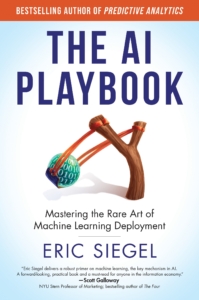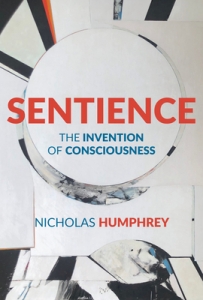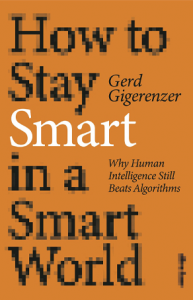“The AI Playbook: Mastering the Rare Art of Machine Learning Deployment” with Eric Siegel
The most powerful tool often comes with the greatest challenges. In recent times Machine learning has emerged as the world’s leading general-purpose technology, yet its implementation remains notably complex. Beyond the realm of Big Tech and a select few leading enterprises, many machine learning initiatives don’t succeed, failing to deliver on their potential. What’s lacking? A specialised business approach and development & deployment strategy tailored for widespread adoption. In his recent book “The AI Playbook: Mastering the Rare Art of Machine Learning Deployment” acclaimed author Eric Siegel introduces a comprehensive six-step methodology for guiding machine learning projects from inception to implementation. The book showcases the methodology through both successful and unsuccessful anecdotes, featuring insightful case studies from renowned companies such as UPS, FICO, and prominent dot-coms. In this episode of Bridging the Gaps, I speak with Eric Siege. We discuss this disciplined approach that empowers business professionals, and establishes a sorely needed strategic framework for data professionals.
Eric Siegel, Ph.D., is a leading consultant and former Columbia University professor who helps companies deploy machine learning. He is the founder of the long-running Machine Learning Week conference series and its new sister, Generative AI World, the instructor of the acclaimed online course “Machine Learning Leadership and Practice – End-to-End Mastery,” executive editor of The Machine Learning Times, and a frequent keynote speaker.
We begin our discussion by addressing Eric’s notable observation, highlighted both in his presentations and book, that the “AI Hype” is a distraction for companies. Eric elaborates on this notion, providing detailed insights. Additionally, we explore the suggestion to shift focus from the broad term “AI” to the more specific “Machine Learning.” Our conversation then delves into the challenges faced by companies and professionals in conceptualising and deploying AI-driven ideas and solutions. This then leads to the consideration of whether forming specialised teams and developing focused strategies are necessary to address these challenges effectively. Next, we delve into the intricacies of the six-step BizML process introduced by Eric in his book, comparing it to the concept of MLOps. We then thoroughly examine the BizML process, dissecting its components and implications. Overall, this has been a highly enlightening and informative discussion.
Complement this discussion with “Working with AI: Real Stories of Human-Machine Collaboration” with Professor Thomas Davenport and Professor Steven Miller and then listen to “Machines like Us: TOWARD AI WITH COMMON SENSE” with Professor Ronald Brachman




Connect With Us